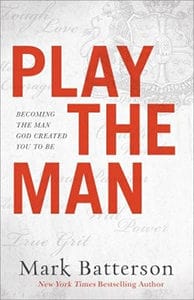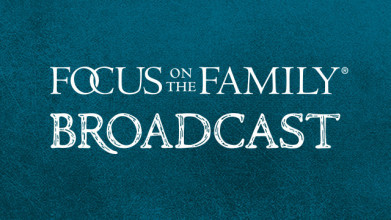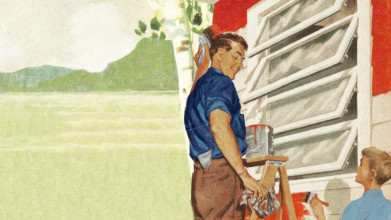Preview:
Mark Batterson: I’m in a room with 500 guys, um, a year or two ago and I asked them how many of them were discipled by their father – and three hands went up.
End of Preview:
Jim Daly: Three out of 500?
Mark: Three out of 500.
John Fuller: Oh my.
Mark: Uh, Houston-
Jim: Wow.
Mark: … we have a problem.
John: Well that’s Mark Batterson and he joins us again today on Focus on the Family. And your host is Focus President and author, Jim Daly, I’m John Fuller.
Jim: Uh, John, last time we started a great program on what it means to be a man. Uh, God intrinsically put in men a desire to become a man of character and virtue, it’s in us, I think, in our spiritual DNA. And as we grow into God’s design, they also become not only better men, but also better husbands and fathers. I know (laughs) most of you wives are going, “Amen, thank you Jim for talking’ (laughs) about that.” Well today, we’re gonna specifically address how we can raise sons to be Godly men and hopefully spark in men that idea that there’s more to manhood than maybe what they have seen. Um, here at Focus on the Family we want to help ya to thrive as a dad, as a husband, and that’s why we’re here, in part, and we have a lot of resources available online to help ya do that.
John: And those would include Mark’s excellent book, Play the Man: Becoming the Man God Created You to Be, and other encouragement. Um- um, uh, the first half of this conversation, uh, last time, Jim, was really inspirational.
Jim: Hm.
John: I want to encourage you as a listener to get a copy on CD or to download it, or, uh, listen on our mobile app, that’s a great way to take it with you as you go. Uh, those resources are all at focusonthefamily.com/broadcast.
John: And Mark Batterson is the senior pastor of National Community Church, that is in Washington, D.C. And he and his wife, Lora, live on Capitol Hill with their three children and, uh, as I said, his book is called Play the Man: Becoming the Man God Created You to Be.
Jim: Mark, welcome back to Focus on the Family.
Mark: Well, uh, excited about round two.
Jim: (laughs) Round two-
Mark: (laughs)
Jim: … here we go, ding- ding. Hey, we ended our conversation last time, uh, talking’ about men who demonstrated virtues such as raw passion and moral courage. Um, let’s recap that for the listener who’s joining us today and what it means to play the man.
Mark: Well, I think playing the man is tough love. Playing the man is, uh, childlike wonder. I think play the man is raw passion, and true grit, and clear vision, and moral courage. It’s- it’s these biblical virtues and, let’s be honest, I- I think women need clear vision, and raw passion, and, uh, moral courage, so it’s not like these are just simply for men.
Mark: But what I’m doing is calling out men to step up, to step in, and I think that, uh, in many ways, we fall in short in part because manhood has largely been devalued in our culture. And so, again, something-
Jim: Yeah.
Mark: … that we need to celebrate and cultivate.
Jim: And as John mentioned, you applied people in history, uh, that really exemplified attributes or virtues that you see as biblical manhood. And, uh, you didn’t talk about Teddy Roosevelt, that childlike wonder. Why don’t we touch that one-?
Mark: Yeah.
Jim: … ’cause I- I’ve read the biography of Teddy Roosevelt, I really enjoyed it. He was a man’s man.
Mark: Oh he was and one of my favorite. He, uh- uh, in fact 1912 he’s campaigning in Milwaukee, and he’s shot at point blank range, a bullet in his chest, and he gets up and he says, “I cannot make a long speech because I’ve just been shot.”
Jim: (laughs)
Mark: And he speaks for 53 minutes.
John: (laughs)
Jim: Amazing.
Mark: By- by the time-
John: (laughs)
Mark: … he’s done, he’s standing in a pool of his own blood. And I’m thinking’ to myself, if he hadn’t been shot, how long would he have-
John: Yeah- (laughs)
Mark: … spoken?
John: … yeah, that was his short s-
Jim: No kidding, that … Well- well it must have been-
Mark: Yeah.
Jim: … his two-hour speech that he-
Mark: Uh-
Jim: … condensed. But that’s-
Mark: Yes.
Jim: … almost crazy though, but that’s, kind of, the pioneer spirit of that era.
Mark: It is. And of course, you know, he did so many things from exploring the Amazon to, uh, you know, being a hero in war. Um, he rode a moose, uh, who does that?
Jim: (laughs)
Mark: Um, but- but my point of the book is that childlike wonder. While he was president he read 500 books a year, so he was a gentleman and a scholar-
Jim: Yes.
Mark: … and, uh, someone that was, uh, had a holy curiosity is what I like to call it.
Jim: And is your point that we’re just missing that kind of manhood today, or, uh- uh, we don’t have enough men stepping up like that? That … You could say he was a unique individual, that you only get one of those ever.
Mark: Well, yeah, but I think what I’m trying to talk about in the book is, you know, the apostle Paul says, “Put childish ways behind you.” And let’s be honest, there are a lot of men who are really boys-
John: Mm-hmm.
Mark: … who haven’t fully grown up, so let’s put childish ways behind us. But Jesus said that “Unless you become like a little child, you cannot enter the kingdom of heaven.” And so, uh, that’s a unique character trait, I think, of manhood, this childlike wonder towards life-
Jim: Hm.
Mark: … and I think it’s exemplified by Teddy Roosevelt.
John: Hm.
Jim: Well it’s good and that was, kind of, the essence of the program last time, talking about Louis Zamperini or John Muir. We didn’t get to John Wesley Powell, uh, your example of true grit. Uh, why is Powell deserving of that description, true grit?
Mark: Well, the first one to traverse the Colorado River, um, go all the way through the Grand Canyon, it was unmapped at the time. But here’s the amazing thing, he did it with one arm.
Jim: (laughs)
Mark: He lost an arm in the Civil War. And so here’s a guy who can’t even row the boat-
Jim: Right. (laughs)
Mark: … and he is leading … He didn’t let what he couldn’t do keep him from doing, uh, what he could and, uh, really, uh, an example of manhood that’s, uh, pretty inspiring.
Jim: That’s the man of Lake Powell.
Mark: Yes.
Jim: I mean that’s it.
Mark: Yes.
Jim: You had Andrew Jackson in there for clear vision.
Mark: Yeah. Well, here’s a guy, a little-known story, that, uh, um, how he got the name Old Hickory that, uh- uh- uh, his troops were, uh, badly battled. I believe they were in Georgia, needed to get back to Tennessee, and, uh, the first person to put one of those wounded soldiers on his horse was the general himself. And he walked, I want to say it’s something’, like, 500 miles-
Jim: Huh.
Mark: … that he walked on foot, the general, uh, from that battlefield back home. And I think in doing that modeled something for the men that followed him. Hey-
Jim: Mm-hmm.
Mark: … here’s a guy that I can follow, here’s someone that has that Christ-like servant’s heart.
John: Hm.
Jim: So that, kind of, rounds out the characters and those characteristics, those Godly characteristics that are part of manhood. And like you said, I’m sure there’s women like Amelia Earhart and others that you could throw in there. But this is talking about, uh, becoming a man, Play the Man, your great book.
Jim: Now let’s focus on how that applies to us today. Tell us about how you got the idea to create a vision for your family. I mean that comes down to it, the visionary. Uh, what were some of the events that led to creating that document for your family?
Mark: Yeah, I think there was a moment where I realized that I had more vision for the church that I was pastoring then the family that God had called me to lead.
Jim: And guys could put anything in there, more vision-
Mark: Yes.
Jim: … for my business, more-
Mark: Yeah.
Jim: … vision for my-
Mark: Yeah-
Jim: … vocation.
Mark: … yeah.
Jim: Uh, we tend to do that, we look externally.
Mark: Yeah, and you- you know, here I am, like, kind of, your typical driven personality (laughs) that, uh, performance-oriented, and, uh, you know, I think doing good things. But I remember this moment, Jim, where I’m- I’m walking through an airport, and I hardly even remember what time zone I’m in because-
Jim: Hm.
Mark: … I’m here, there, and everywhere, and I’m preaching the gospel. But there’s just this emptiness inside and I realized that I may be putting my family on the altar of ministry-
Jim: Hm.
Mark: … and I just don’t believe God’s called me to do that. I believe-
Jim: Hm.
Mark: … that my chief function is to be a- a husband to my wife and a father of my children. And so there was just this moment where at the end of the day I want to be famous in my home.
Jim: Yeah.
Mark: And, uh, it’s hard to be famous in your home if you aren’t home. And so, uh, I have a little definition of success. It’s, “When those who know you best respect you most”-
Jim: That’s good.
Mark: … and that’s my wife and my kids.
Jim: You know I, in the book, uh, Good Dad that I wrote, uh, there was a story I captured in there, it was, really caught my attention. It was a youth pastor, a young guy, who- who had a family, had a little daughter, maybe four years old, and he was busy with doing youth pastoring. And he was between events, and came home, and quickly showered, and said to his little four-year-old girl, “Hon, I’m sorry, but tonight I gotta go out and teach teenagers about Jesus.” And she said to him, talk about an amazing statement, she said to him, “That’s great daddy, when are you gonna stay home and teach me about Jesus?”
Mark: Wow-
John: Hm.
Mark: … whew.
Jim: He quit that pastorate job, took a job at GM that was 8:00 to 5:00-
Mark: Hm- hm.
Jim: … just put on the assembly line, and he just said, “I’ll get back to ministry when my daughter-
Mark: Hm.
Jim: … is 18.”
Mark: Yeah.
Jim: And he poured into her life. What a dad.
Mark: Yes.
Jim: There’s an example-
Mark: Yes.
Jim: … of putting the priorities right.
Mark: Yes.
Jim: And he could still be a minister in the that environment, God could still use him on the assembly-
Mark: Hm.
Jim: … line at GM, but what an amazing commitment to his little girl who was saying, daddy, be my daddy.
Mark: Yes.
Jim: Teach me about Jesus.
Mark: Yes.
Jim: Wow.
Mark: You know, Jim, we think about revival as something that needs to happen in America or in our culture, but here I am at Focus on the Family.
Jim: Yeah, right.
Mark: And the truth is, I think revival starts in the home, and its why last note of the Old Testament, uh, that God would turn the hearts of the fathers to their children. And then if I quiz the average pastor, and I’m a pastor, um, and said what was John the Baptist’s message? You know, most of them would say, “Repent and be baptized,” and that’s true. But there’s another little piece of that puzzle where he says, “That I’ve come to turn the hearts of the father to the children.” Now isn’t that interesting?
Jim: Yeah.
Mark: Last note of the Old Testament, first note of the New Testament. I think God’s kingdom is gonna come, his will is gonna be done if we could just focus on the family.
Jim: Yeah (laughs) and that-
Mark: And- and, uh-
Jim: … we always appreciate that.
Mark: … and- and here’s how I like to say it, Jim. You know, uh, it’s, uh, I love youth pastors, but it’s not their job to disciple my kids, that’s my job.
Jim: Ah.
Mark: And I’ll take the tag team, I’ll take all the help I can get, but at the end of the day, uh, it’s my job to disciple my kids.
John: Mm-hmm.
Jim: That’s the support team around you. Um, let me press ya for the practical ways that has worked in your family. I mean-
Mark: Yes.
Jim: … as you’ve done this vision casting with them, what have you seen?
Mark: Yeah. Well, uh, this is so fun for me because, uh, I consider it one of the most important things I’ve ever done, more important than writing a book or pastoring a church.
Mark: Before my oldest son’s 13th birthday, I decided that I would create a discipleship covenant. And, uh, we went camping, and I put it on parchment paper, and, uh, tried to make it pretty official, and I created a mental challenge, spiritual challenge, and physical challenge. And if you want, we can, kind of, dive into some of that.
Mark: But then it began a year of discipleship and I said, “If- if you fulfill this covenant, uh, at the end of it we will do a rite of passage,” and- and I can tell you what I did with both of my sons. But it- it really, I believe, is one of the most important things I’ve done in terms of discipling my own sons.
Jim: Yeah. No, that is good. Uh, explain the five practical ways to create a family vision. I mean-
Mark: Yeah, so-
Jim: … I like the concept, and we can fill in the blanks, and-
Mark: Yes.
Jim: … a few things uniquely-
Mark: Yup.
Jim: … but what are the five basic components?
Mark: Well, I mean it starts with prayer, I mean let’s pray into this. And then I think you do your homework, let’s learn. So I started studying what other dads had done, what other cultures had done in terms of, um, discipling. And then, uh, you know, I think you take a little vision retreat. Uh, I had this formula change of pace, plus change of place, equals change of perspective.
Jim: Yeah.
John: Mm-hmm.
Mark: And so take some time, this is the important stuff, and let’s find the margin to get a vision, uh, for our marriages and for our children, and- and then I think you write down the- the vision and, uh, it needs to be perfect the first time.
Jim: (laughs) Good.
Mark: No it doesn’t-
Jim: Yeah.
Mark: … uh- uh, it’s a rough draft and it’s gonna change over time. And then you rewrite the vision and, uh, over time what you have is a vision statement, uh, for your family and something that can help guide you.
Jim: What does it sound like? Give us, uh, an example.
Mark: Well, uh, for us, we came up with four family values, for example, humility, generosity, gratitude, and courage.
Jim: Hm.
Mark: And so if there’s anything that’s gonna define what it means to be a Batterson, I want it to be those four things. And- and then what you do is you just, in the course of life, the rhythm of week in and week out, you find opportunities to cultivate gratitude, and to model generosity, and to show courage, and to just operate in that spirit of humility.
Jim: What would be, uh, we play the man, what would be an example in your marriage where you had to play the man? You know, something … Parenting you can, kind of, control that environment to some degree with your kids-
Mark: Hm.
Jim: … it’s a little more difficult with your spouse. (laughs)
Mark: Yes.
Jim: So give us an example of how this is played out with-
Mark: Yeah-
Jim: … your marriage.
Mark: … yeah. You know, I’ll be very transparent, there was a moment where I’m traveling here, there, and everywhere and, uh, my wife, uh, who is a person of more integrity than anybody I’ve ever met-
Jim: Hm.
Mark: … is kind, and beautiful, and, uh- uh, she says to me, “This isn’t what I signed up for.” And that was the moment where I realized that I needed to put some boundaries in place to guard my family, to make sure that my family was first, and so we made some changes. I said, “I’m not gonna travel more than 12 overnight speaking trips,” and, um, “I’m not gonna be gone more than one night a week, I’ve gotta be helping my kids with homework, I’ve gotta be coaching their teams,” like, I’ve gotta be invested in my family and you start just, kind of, reprioritizing. And-
Jim: Hm.
Mark: … and one of the things that we do is we do an annual retreat, and it helps us revisit the vision. And so we’re looking at calendar and budget, but we’re also looking’ at a verse for the year, and- and, uh, we’re revisiting, “Hey, how are we doing’ on our values?” Um, and I don’t want this to sound like we have it all figured out, uh, we do not, and often, uh, there needs to be a reclarifying of that vision, ’cause life happens. And- and-
Jim: Right, and time, over time, you refine, you refine, you refine.
Mark: Yes.
Jim: I appreciate that-
Mark: Yup.
Jim: … because I think that’s, makes it a little easier for us, others to get engaged with that.
Mark: Yeah.
Jim: Hm.
Mark: But instead of living reactively to, kind of, whatever’s happening in life, you’re making proactive decisions about what’s important to you and how you’re gonna invest your time, and money, and energy.
John: Hm. Mark Batterson is our guest today on Focus on the Family with Jim Daly, and, uh, you can find inspiring ideas for your walk with God and your family, uh, in Mark’s book, Play the Man. Now we’ve got that and a CD or download of our conversation, uh, yesterday and today at focusonthefamily.com/broadcast. Or if you have questions give us a call, 800-232-6459.
Jim: Yeah, Mark you mentioned the discipleship with your sons, I do want to come back to that because I think there’s some great practical advice, and then we’ll go to the rite of passage. But how did you see your boys change during that year and, uh, how did you change as their dad?
Mark: Well, I- I think it showed them that they’re a huge priority in my life. Uh, we did a- a weekly FSM, Father Son Meeting.
Jim: (laughs)
Mark: And I wish I could tell you that all of those, you know, there was an angelic choir, a moment of revelation, and there wasn’t. But it showed my sons that we’re gonna walk together, we’re gonna learn together. And I’ll tell you what, one of the great pieces was actually the physical challenge. Um, we trained for a triathlon, my oldest son and I. When you sweat together, when you’re going’ after a goal together-
John: Hm.
Mark: … it will bond a father and a son. I’ve gotta say, one of the greatest moments of my life was crossing that finish line, and right now-
Jim: Yeah, (laughs) ’cause you’re done.
Mark: … with my youngest son-
Jim: (laughs)
Mark: … ’cause I’m done, and right now with my youngest son, we’re training for a bike century, so we’ll-
Jim: Good for you.
Mark: … bike 100 miles.
Jim: Man-
Mark: Yeah.
Jim: … that is outstanding. Um, uh, for the dad listening to you that’s going’, “Man, I didn’t get that modeled for me,” and I- I would just say don’t use that as a crutch. Um, that may be true, but you’re a different person than your father who may never have done this with you.
Mark: Mm.
Jim: But, to their point, how- how do I really get started? I think I can feel this a little bit. You know, there’s times where I feel like I’ve received an A on the dad report card, but other times maybe a D or an F because I haven’t been as intuitive, I haven’t been … I wasn’t present, I didn’t know what I wasn’t, um, doing properly. I mean I didn’t-
Mark: Yes.
Jim: … have a father. I was an orphan kid-
Mark: Yes.
Jim: … and I- I feel at times I’m just trying’ to do this by the seat of my pants.
Mark: Yes. And that’s where, let me say this, I’m so grateful I have a wonderful father. I also have spiritual fathers. And, uh- uh, those spiritual fathers have spoken into my life in a way that it’s not based on biology. And so, uh- uh, this is like a team effort right here. And I think the critical thing I want to keep saying is, “Uh, don’t beat yourself up about mistakes you’ve made.” In fact, by the way, I had this little theory that, uh- uh- uh, all of us are gonna feel, uh, like we failed on some level as dads, but God gives us a second chance and it’s called being a- a grandfather-
Jim: Yeah. (laughs)
Mark: … uh, or a grandparent-
Jim: Yeah.
Mark: … so you get a second go around. So, you know, the big thing was I wanted to be able to look in the mirror and know that I gave it a good effort, that I really had intentionality. And so I actually crafted that discipleship covenant and it’s available for anybody that wants it, and, uh, it’s a good starting part. And I think you ought to take it, and adapt it, and put your fingerprint on it, but, uh, you know, I wanted in this book to just share what I’ve done with my two sons as a prototype or a little case study for other guys.
Jim: Sure. One of the creative things you did, which again I- I like doing this, ’cause you’re action-oriented, you’re doing something with your boys. In this regard you took ’em to Theodore Roosevelt Island and, uh-
Mark: Yes.
Jim: … y- you know, why did you do that, how did you pick it out, and what occurred there?
Mark: Well, it’s this beautiful little island, uh, off of, uh, right across from Georgetown, so, kind of, right where I live, I live on Capitol Hill. And I thought, you know, it’s a nice, kind of, natural setting, we had grown up takin’ the kids on hikes there, and so I thought we’re gonna do this special event at the end of this year of discipleship. And I invited their uncles to come, and- and by the way, it could be an uncle, it could be a, uh, just a guy that maybe your son looks up to, and I surprised my boys. And these uncles had just, kind of, prepared speeches and gifts that symbolized what- what they were calling him to, kind of inviting him into that circle of manhood so to speak, and, uh, just this incredible rite of passage. Because here’s the problem, in our culture, uh, what is it, how do boys know they’re men? Uh, you know, maybe it’s the license when they’re 16, or, you know, unfortunately, I think for a lot of people in our culture that 21 drinking age. I mean, come on, we’ve gotta do better than that.
Jim: Right.
Mark: And- and so I just chose 13. I think it could be younger if your kids are mature enough, it could be older, in fact, it’s never too late to do it. And so that’s what I chose, just, uh, this, kind of, rite of passage, um, at Roosevelt Island-
Jim: Mm-hmm.
Mark: … by the way, followed by a steak dinner.
Jim: (laughs)
John: (laughs)
Mark: (laughs)
Jim: I love it, that is good. Um, for the mom listening who wants to see her husband investing this way in her sons, I’m sure there’s a longing in many moms’ hearts that they’re just not seeing that, and they would hope that, uh, dad would step up. (laughs) They might be praying silently for that.
Mark: Hm.
Jim: How can they, uh, m- m- move their husband a little further along in this way and do it in a way that doesn’t damage the relationship?
Mark: Yeah. Well, uh, you know, that motivation has to come on some level from the inside out. And so I believe in the power of prayer, I think you start praying, um, that God would, uh, birth that in their hearts, that God would turn the heart of that father to their children.
John: Mm-hmm.
Jim: Yeah.
Mark: Uh- uh, I think you find ways to encourage it. Um, “Hey, if you guys want to go camping this weekend, I’ll hold down the fort.”
Jim: Uh-
Mark: Um, you know-
Jim: … yeah, right.
Mark: … let- let them begin to, like, kind of, bond in that way. You know, I know a few people are- are dropping this book or audio book on their husbands that do it in a way that’s not, you know, uh-
Jim: Something’ you might want to listen to.
Mark: … uh, yes.
Jim: Right.
Mark: But, uh … And so you- you, kind of, speak that word of encouragement.
Jim: How about for the single mom-
Mark: Yes.
Jim: … single parent mom who’s struggling to be everything.
Mark: Yes.
Jim: I mean she’s already got such a burden.
Mark: Yeah.
Jim: I know there’s single parent dads as well-
Mark: Yeah.
Jim: … and, uh, I’m assuming you’re gonna play the man in that role.
Mark: Yes.
Jim: But for the mom who doesn’t have that regular infusion of manhood-
John: Hm.
Mark: Yes.
Jim: … especially into her boys’ lives-
Mark: Yup.
Jim: … uh, what can she do?
Mark: I love that question. You know I’m a pastor and so here’s what I believe. God’s given us two families, a biological family, but he’s given us a- a spiritual family, it’s called the church. And I think it’s the church that needs to rally around. Uh, I bet that there’s some, uh, men with, uh, enough maturity, and love, and wisdom, uh, that maybe they don’t have a biological son. Uh, we’ve gotta find ways to help those men step into that role of being a spiritual father. Uh, I just think that’s something that needs to be celebrated and championed in our culture. Um, you know, Paul said, “I- I have a thousand teachers, but not many spiritual fathers.” This is a unique capacity.
Jim: Mm-hmm.
Mark: We need more men to step into that role to help raise up that next generation and pass that baton of faith.
Jim: Man, this is good. Um, the timing is perfect for me, Mark, because I’m about to take my boys up to the Boundary Waters and spend a little time with them up in that rather remote area. I’ve never been up there; I’m scared to death.
Mark: (laughs)
Jim: Um, but, you know, canoeing in, doing a little fishing, sitting around a campfire, you’ve given me some great ideas here of things to talk about and, uh, I love that rite of passage idea. Um, so many good things in your book, Play the Man. I love the way you’ve connected these characters in history. Some of ’em, you know, you’d say, well they’re not, you know, talking’ about Christ all the time. That’s okay, because the attributes of God can be seen in his creation, including humanity and just men and women that do incredible things. I think so often those are attributes and characteristics of God in them-
Mark: Hm.
Jim: … you know, especially, obviously, when they’re doing good noble things.
Mark: Yes.
Jim: That’s Godly character-
Mark: Yes.
Jim: … even if they don’t know God. Isn’t that true?
Mark: Yes, it is. And, uh, I might just share one last thought, Jim, that, uh, if all else fails, you know, I certainly share, uh, discipleship covenant, rite of passage, the trips that I took with my sons, some logistics and mechanics. But, you know, at the end of the day, can I just tell you my father’s heart is that my children, uh, would hear, wh- what the Father spoke over Jesus at the baptism. Uh, he said, “This is my beloved son in whom I am well pleased.”
Jim: Yeah.
Mark: At the end of the day, our children need to hear those words-
Jim: Yeah.
Mark: … they need to have that blessing. And, so, we’re gonna make some mistakes-
Jim: Hm.
Mark: … but let’s make sure that they know that you are my beloved son, my beloved daughter, who’s not perfect, just-
Jim: Uh-huh.
Mark: … like their mom and dad, but in whom I am well pleased.
Jim: Well, and that’s well said and, uh, what a place to end today. Um, I have one more question I wanna ask ya, but first let me turn to the listeners and- and say today’s program has certainly highlighted why we exist. Uh, we want to help you and your family, and dads, a lot of it starts right there with us. And, uh, I want to encourage you to get a copy of Mark’s book, Play the Man, because I think it has some of the, uh, wonderful insights that will make you a better husband, a better father, and that’s our goal here at Focus on the Family. If you can make a donation of any amount, um, we will send you, as our way of saying thank you, a copy of Mark’s book.
John: Make that donation and, if you can, um, make it a monthly pledge when you’re at our website, we’d really appreciate that. Those monthly gifts on an ongoing basis really sustain us here and allow us to do ministry every day. And, uh, if you’re in a spot you just can’t pledge on a monthly basis, do send a generous one-time gift of any amount, uh, either way we’ll send a copy of Mark’s book to you as our thank you gift. Do that at focusonthefamily.com/broadcast or call 800, the letter A, and the word FAMILY.
Jim: Mark, that last question is a tender one as we close. I’m aware that, um, there is a dad, maybe several, who are listening who, they have that older child, maybe late teens, or they’ve even moved outside the home already and they’re in their 20s, and they’re not looking’ back, they’re- they’re gone. And maybe a lot of strife occurred, and distance occurred, um, that discipleship never really happened for whatever reason. Is it too late? And better yet, what can a dad do to close the gap?
Mark: Yeah. Well the good news is, it’s never too late and his grace covers a multitude of sin. Uh, he’s the God who brings reconciliation, he’s the God of second chances, and so here’s what I believe. Start praying, uh, for that son. Maybe even just, with complete transparency, admit the mistakes that you made, that might even be the first step to, kind of, bring that reconciliation. And I tell you what, there’s still a longing in that child for a father’s blessing, for a father’s love. And you do that now, you step up and begin to do that now, and I believe it can change that circumstance, and bring healing, and bring wholeness.
Jim: Boy, that’s well said, Mark, thanks for being with us.
Mark: Uh, it’s a joy, thank you.
John: And on behalf of Jim Daly and the entire team here, thanks for listening to Focus on the Family today. I’m John Fuller inviting you back next time, uh, as we once again help you and your family thrive in Christ.





















